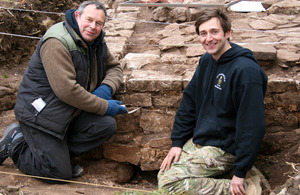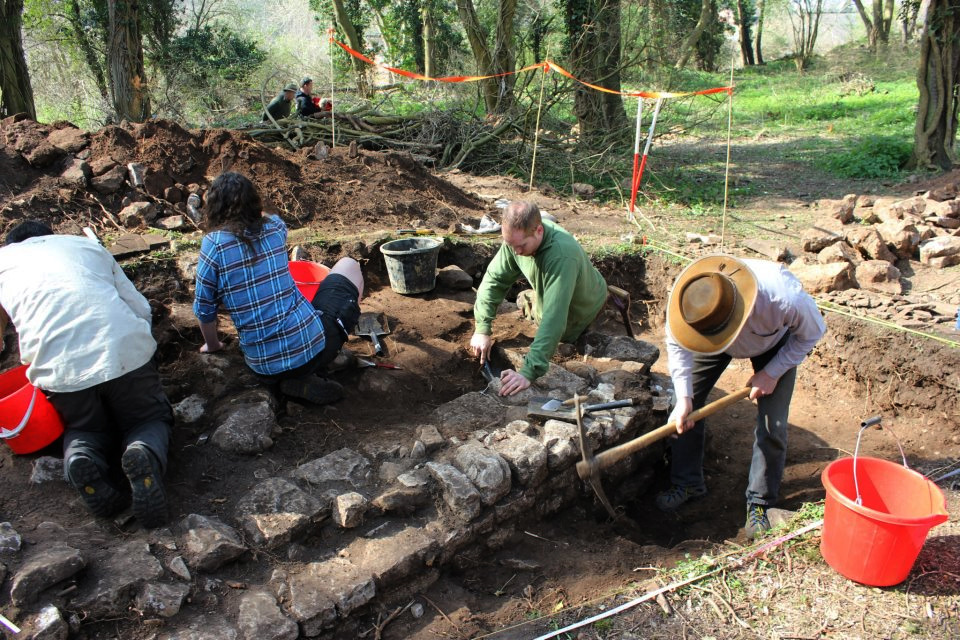Soldiers help excavate Roman site in Wales
An award-winning project is using archaeology to aid the recovery of injured soldiers.

Historic Environment Advisor Phil Abramson and Captain Paul Johnstone-Armstrong on the site of the Roman building in Caerwent [Picture: Crown copyright]
Operation Nightingale - which has been recognised by the British Archaeological Awards for its innovation - has seen soldiers excavating the remains of a Roman building at Caerwent Training Area near Newport.
The Defence Infrastructure Organisation (DIO) and Defence Archaeology Group worked with a number of units including The Rifles to create the unique and hugely successful programme, which gives injured military personnel the opportunity to learn a series of excavation, land survey, drawing and mapping techniques.
The soldiers, who joined the programme voluntarily, will also produce a report of their findings which will help enhance their publication and presentation skills.
The majority of soldiers who took part were serving personnel; however there were also a number of injured veterans on the programme, including from the Falklands conflict. The participants had suffered a broad spectrum of injuries including physical and psychological trauma.
The excavation work took place under the supervision of archaeologists from DIO, the Defence Archaeology Group and the University of Leicester, which supported the project. A group of students from the university also worked alongside the soldiers.
Other partners including Cadw - the Welsh Government’s historic environment service - and the Army’s survey unit, 135 Independent Geographic Squadron, helped to deliver the programme.
The excavation at Caerwent started on 24 March 2013 and involved a total of 18 soldiers working to uncover a stone building thought to date back to the 3rd or 4th Century CE.
Caerwent Training Area covers an area of approximately 1,500 acres largely covered by woodland and industrial buildings. Investigations which took place at the site last year uncovered Roman artefacts including coins and a hypocaust (a Roman heating system).

Operation Nightingale participants at work on a hypocaust at the Roman site in Caerwent [Picture: Crown copyright]
Richard Osgood, DIO’s Senior Historic Advisor, said:
DIO’s priority is to support our Armed Forces. There are long-standing connections between the profession of archaeology and the military. This work draws on a number of important skill sets to give the soldiers an enduring interest in heritage and their environment.
The project has proved of immense value thus far in assisting the recovery of soldiers in The Rifles and other units, while at the same time accomplishing some great archaeology.
Sergeant Diarmaid Walshe, who is also a qualified archaeologist, said:
The feedback from Service personnel who have attended the programme so far is that every single one has enjoyed themselves and gained a positive experience that has helped their recovery.
The key to the success of the project is that the soldiers undertake many different activities, from digging to surveying, photography and finds processing. The programme gives them something useful to do which can help rebuild their self-esteem, provide them with a sense of purpose and give them something positive to strive for.
This programme is also about giving something back to the local communities around Chepstow and South Wales who have shown strong support to our injured personnel.
Professor Simon James of the University of Leicester said:
We are pleased to be lending our continued support to Operation Nightingale which offers unique opportunities for both the soldiers and the students of the University of Leicester who are working together on the dig.
Operation Nightingale projects like this give injured soldiers the chance to build on their military skills to explore a novel and rewarding activity; our students help teach them archaeological techniques while learning from the soldiers how to look after themselves in the field.
The Defence Archaeology Group has been set up to help oversee Operation Nightingale to help harness and raise the awareness of Service personnel in matters connected with archaeology and heritage.